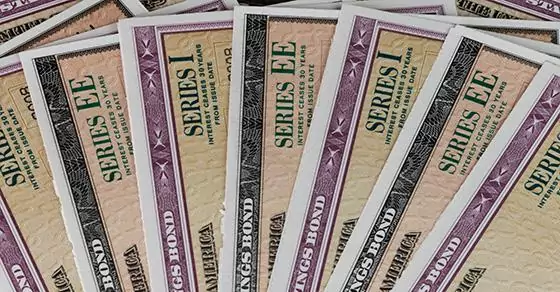How savings bonds are taxed

Many people have savings bonds that were purchased many years ago. Perhaps they were given to your children as gifts or maybe you bought them yourself. You may wonder how the interest you earn is taxed. And if they reach final maturity, what action do you need to take to ensure there’s no loss of interest or unanticipated tax consequences?
Interest deferral
Series EE Bonds dated May 2005 and after earn a fixed rate of interest. Bonds purchased between May 1997 and April 30, 2005, earn a variable market-based rate of return.
Paper Series EE Bonds, issued between 1980 and 2012, are sold at half their face value. For example, you pay $25 for a $50 bond. The bond isn’t worth its face value until it matures. New electronic EE Bonds earn a fixed rate of interest that’s set before you buy the bond. They earn that rate for their first 20 years and the U.S. Treasury may change the rate for the last 10 years of the bond’s 30-year life. Electronic EE bonds are sold at their face value. For example, you pay $100 for a $100 bond.
The minimum ownership term is one year, but a penalty is imposed if the bond is redeemed in the first five years.
Series EE bonds don’t pay interest currently. Instead, accrued interest is reflected in the redemption value of the bond. The U.S. Treasury issues tables showing redemption values. Series EE bond interest isn’t taxed as it accrues unless the owner elects to have it taxed annually. If the election is made, all previously accrued but untaxed interest is also reported in the election year. In most cases, the election isn’t made so that the benefit of tax deferral can be enjoyed. On the other hand, if the bond is owned by a taxpayer with little or no other current income, it may be beneficial to incur the income in low or no tax years to avoid future inclusion. This may be the case with bonds owned by children, although the “kiddie tax” may apply.
If the election isn’t made, all of the accrued interest is taxed when the bond is redeemed or otherwise disposed of (unless it was exchanged for a Series HH bond in an option available before September 1, 2004). The bond continues to accrue interest even after reaching its face value but at “final maturity” (after 30 years) interest stops accruing and must be reported (again, unless it was exchanged for an HH bond).
If you own EE bonds (paper or electronic), check the issue dates on your bonds. If they’re no longer earning interest, you probably want to redeem them and put the money into something more profitable.
Inflation-indexed bonds
Series I savings bonds are designed to offer a rate of return over and above inflation. The earnings rate is a combination of a fixed rate, which will apply for the life of the bond, and the inflation rate. Rates are announced each May 1 and November 1.
Series I bonds are issued at par (face amount). An owner of Series I bonds may either:
- Defer reporting the increase in the redemption (interest) to the year of final maturity, redemption, or other disposition, whichever is earlier, or
- Elect to report the increase each year as it accrues.
If 2 is elected, the election applies to all Series I bonds then owned by the taxpayer, those acquired later, and to any other obligations purchased on a discount basis, (for example, Series EE bonds). You can’t change to method 1 unless you follow a specific IRS procedure.
State and local taxes
Although the interest on EE and I bonds is taxable for federal income tax purposes, it’s exempt from state and local taxes. And using the money for higher education may keep you from paying federal income tax on the interest. Contact us if you have any questions about savings bond taxation.
© 2022





